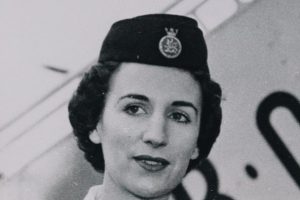
As a lead-up to its 100-year anniversary next year, British Airways is marking the 60th anniversary of its first flight using a turbo jet engine aircraft from Europe to New York.
The jet flight reduced the 18-hour trip from London to New York to 7-hours.
On October 4, 1958 the airline flew two de Havilland Comet 4 aircraft, one from New York to London and the other from London to New York.
The airline hosted special anniversary event at its headquarters to celebrate the event.

One of the original cabin crew members, Peggy Thorne, 91, who had joined BOAC in 1950 and was hand-picked to serve customers on the first flight was at the event.
“It was marvellous” she said. “We were used to travelling to New York on Boeing Stratocruisers which took up to 20 hours. We couldn’t believe the flight was possible in such a short time.”
“It was so exciting to be the first – wonderful. There were all sorts of dignitaries on board, press and the chairman of BOAC. It was a thrilling experience. We served customers Madeira biscuits and coffee when they came on board, followed by cocktails and canapes, and then a five-course lunch with wines. Petit Fours followed and then there was Afternoon Tea! Our customers loved it – they ate and drank from when they got on board until the time they got off.”

Captain Hugh Dibley FRAeS, a former Comet 4 navigator, was also at the event.
He said: “The Comet 4 was delivered to BOAC on the 30th September and flew across the Atlantic on the 4th October, which was quite a surprise to some people, not least because it was so fast!”
“The Comet 4 was a firm favourite with pilots, as it was nice to fly and the design meant it was quite easy to make smooth landings. It also had great passenger appeal due to it’s beautiful appearance and take-off performance.”
BOAC beat US airline Pan Am which had been promising that it would be the first airline to do this.
In 1958, the Comet 4 carried 48 customers every day from London in two cabins: two cabins, Deluxe and First Class. A ticket cost the equivalent of £8,000 today.













